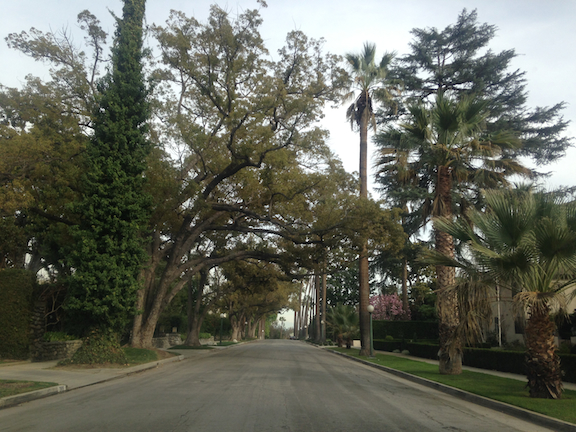C wore red corduroys. Her neck was bare. She said she felt naked. She got a scarf. She replaced her slippers with leopard-print flats. She had gotten us chicken tamales. I said I don't eat them. She suggested we go out. She got a red vest. She has been using a red-leather bag. Her wallet is red leather. I helped her to the car. She is likely to refuse help. There was a space between the car and curb, which made it easier for her to step inside. I closed the door for her. The car was messy: two containers of oil in a cardboard box in the back. I had dusted the dash-board on my way. I asked whether we were driving the right way. Yes - she said. There is no other. She took my hand as we crossed the street and then let go. We found a place to sit. She said hello to a friend. She introduced me. The man behind the counter was muscular, attractive. He asked whether we might like champagne. She wanted it, and so did I, but I wouldn't have said yes without her. It's a cafeteria-like place. You order at the counter. I drank my champagne quickly and took small bites of sandwich to make the time lengthen. It didn't help much; she was speaking so ate much more slowly. I had smoked-salmon on pumpernickel and she had chicken on focaccia with an endive salad. It was endive tossed in a vinaigrette. She said the focaccia was delicious but she couldn't finish. She noticed there were a few Asians. She took the new curator to lunch this week. She had been speaking about the new curator for weeks. The curator thought she was rich, that's why. The curator had called her up. People think she's rich for how she dresses. She wears heavy rings. Maybe all the red. She likes a little flare. She took the curator to her club. The curator is an attractive woman. She has no lines in her face. She is Hong Kong Chinese. She repeated: Chinese. Hong Kong Chinese. There were two Asian women at the table adjacent at their lunch. It reminded her of lunch in Hong Kong. At the Royal Jockey Club the women wore French designers and were served by Brits. She had been in '95. It was during a monsoon. Bonnie took her to the Royal Jockey Club for lunch. C met Bonnie in Pasadena. They came from Hong Kong so her daughter could look at schools. Her husband (Chinese) was a doctor. He had treated Bush Sr. on his trip. She doesn't know how they met, Bonnie and her husband. Why was Bonnie so nice? It was her last day in China, at the end of the tour. She had called Bonnie up about finding diamonds. Bonnie called back and said she would pick her up. She picked her up in a Rolls Royce. The driver was a burley, muscular man. She brought her to the Royal Jockey Club for lunch. They had four restaurants and tennis courts. Bonnie took her to the best of the restaurants. They had oysters from around the world. How did they get there? Packed on ice. The women were all in French designers. After, Bonnie took her to her husband's office. Bonnie is such a middle-American name. Maybe they met at University. The office had no evidence of a medical practice. There were pictures of her husband with Bush Sr. on the wall. They had pictures at the races. The secretary in the doctor's office took them to buy diamonds. The diamonds were machine-cut and set in platinum. She didn't want anything machine-cut. After the diamonds, they went to tea. There was a monsoon. The gondola wavered in the wind. That evening she went to A's house for dinner. He was friends with her son-in-law. She wore her best Italian shoes. It was in the middle of a monsoon. The water was knee-deep. She stepped knee-deep in water in her best Italian shoes. It was in the best part of town, on a hill. Their lacquer cabinets cost enough for college. She asked A why Bonnie might be so nice. He said they liked to know people in every city. The next day, C flew home. At the airport, the OJ verdict was playing on the news. The judge lived a couple blocks away. He lost his reputation. She would hire the lawyer any day. It was downtown since they thought the jury would be better, but the women were used to abuse. I said: really? Which was all I could say. She said yes, they didn't mind. She saw it all the time. She worked with them. She couldn't eat any more focaccia. We left. I held her hand to the car and we went for her dry-cleaning. Another woman runs it now. The woman who used to run it, when her husband grew ill, prostrated herself before C. She lay herself down before C. C said "Maybe that's how they greet people." She showed me with her arms what the woman had done. She never felt so moved. I went with her inside to get the dry-cleaning. The woman behind the counter had curled her hair. She introduced me. I took the dry-cleaning for her and hung it in the car and we drove home. I helped her to the door. Two neighbors were at the door. A big wreath hung above. She said they'd never put a wreath like that out before. I waited until she had opened the door and pressed her hand and kissed her on the cheek and walked back to my car.
